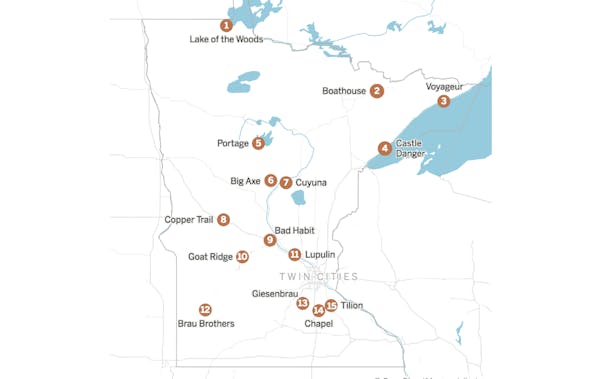Kicked back on a patio overlooking the equally casual Cannon River and historic Archibald Mill ruins, farmer Scott Androli didn't really need to explain what brought him out to Chapel Brewing in Dundas on a breezy Thursday afternoon. But he offered a good explanation nonetheless.
"I can drink beer at home," said Androli, who lives in nearby Kenyon, "but not beer this good. And not in a setting like this."
Cooped up by winter and then quarantine, Minnesota beer lovers are finally busting out and cautiously hitting their local breweries this month — even (and especially!) beer lovers in outstate locales.
Not just for hipsters in the Twin Cities and Duluth anymore, Minnesota's great brewery boom has spilled over into small towns in recent years. There are brew houses literally all over the state map, some in towns that don't even have a Dairy Queen or sizable grocery store.
You can order a red ale in Red Wing, a British bitter in New London, a porter in Perham and an IPA in TRF (Thief River Falls). You can even find an ore-tinted amber in the once rusted-out mining town of Crosby, where just five years ago Cuyuna Brewing's owners had a hard time selling bank loan officers on the idea of a small-town brewery.
"The banks all thought the brewery wave had kind of plateaued just based on the big explosion in the Twin Cities," Cuyuna's Nick Huisinga recalled. "We had to throw all kinds of numbers at them to convince them it could work in a small town."
Fortunately, Nick and his wife, Laura — theirs is a true mom-and-pop main-street business — already had a bundle of financial figures on hand courtesy of the Cuyuna Lakes Mountain Bike Crew. It was actually the local bike-trails association that persuaded the Huisingas to open their brewery in Crosby, hoping to add to the tourism already generated by the Cuyuna County Recreation Area's trails.
That's one factor driving Minnesota's small-town brew boom: The towns themselves have been wooing prospective brewers to help get their communities hopping again.
Chris Larson and his partners at Tilion Brewing were hoping to open their business in St. Paul but they couldn't find an affordable space. A contact at the Minnesota Craft Brewers Guild put them in touch with the mayor of Cannon Falls.
"We never thought we'd be in a town like this, but once we came and looked around and talked with the powers-that-be, it started to make more and more sense," said Larson, whose team got a low-interest loan for equipment and other perks from the city.
Tilion even got local residents to serve as investors. Among them: Buzz and Nancy Pedersen, retirees from Apple Valley who now spend much of the year at an RV park within walking distance of Tilion.
"I tasted the beer, and I was sold," Buzz said while enjoying the "perks" of his investment on a quiet afternoon last week.
Upriver from Tilion, just west of Northfield, Chapel Brewing's owners were also looking to build in a more sizable town. That changed when the local announcer for the Dundas Dukes town baseball team, Ira Carlson, tipped them off to a vacant 1880s-era chapel across the street from where he grew up.
"I like unique breweries with character, and this one obviously is that," said Carlson, who provided a 1940s-era Dukes jersey to hang on the wall there. The brewery, in turn, provides the low-alcohol Dukes Lager to be served at games.
Chapel's and Tilion's close relationships with town leaders and local residents paid off once the COVID-19 lockdown began in March.
The hometown patrons all made a point of buying crowlers (32-ounce cans) and gift cards during quarantine. City leaders helped the breweries by quickly adjusting local ordinances and permits to allow for takeout beer sales, and to expand patio spaces once on-site consumption could resume in June. Chapel's "patio" now includes a grassy, wildflower-lined slope to the river that might be the state's prettiest patch of brewery.
"It helps when the mayor is also a customer," said Chapel co-founder Tracie Vranich.
Way up north in Warroad, Lake of the Woods Brewing Co. has been doubly hit by coronavirus-related complications, three years since its opening: The ongoing U.S.-Canada border closure has cut into much of the fishing tourism that drives the brewery.
"Lucky for us, we couldn't have asked for a better community to be in," said Lake of the Woods' head of sales Brittney Peterson, thanking local residents for buying up their newly ramped up offerings in cans.
Another sign of community support: The brewery even got a great deal on the expansive windows in its riverside taproom from the big employer in town, Marvin Windows.
Selling more than beer
In a sad twist, though, one of the state's largest small-town brewers, Castle Danger Brewing in Two Harbors, was too big to offer takeout sales during the lockdown.
State law limits breweries that produce more than 20,000 barrels of beer annually from selling beer to-go in their taprooms (a long-derided law that also kept many Twin Cities and Duluth taprooms shuttered through June 1).
"It was already a significant loss of revenue for us pre-COVID, [and] eliminated revenues during the shutdown," Castle Danger co-owner Lon Larson said.
In a show of small-town support, Two Harbors' mayor and city council began lobbying to change that law. And no wonder: Since opening in 2014, Castle Danger's taproom has been a big factor in keeping North Shore travelers in town longer than a fill-up at the Holiday Station on Hwy. 61. About 90% of the taproom's customers are tourists.
"All four owners have ties to the North Shore, with three of us growing up in Two Harbors," Larson noted. "We wanted to help grow tourism in the area."
They weren't being entirely selfless, though: "We also get to enjoy the wonderful outdoors of living and working on the North Shore," Larson added.
Still a St. Paul resident, Chapel Brewing's co-owner Vranich said she's happy to commute to tiny Dundas (population: 1,594) — as are many customers who trek from the south metro suburbs.
"I think most people who go to breweries are looking for something besides a dark bar to hang out in, or the large industrial spaces that a lot of city breweries are in," she said. "They want a friendlier atmosphere and a better experience."
Vranich lit up when another of Chapel's regular customers, Will Schroeer, came in and started talking about the birds and bees, as in he actually goes there to observe flying creatures along the river while drinking his beer.
"You see what I mean about it being as much about the experience as the beer?" Vranich said.





